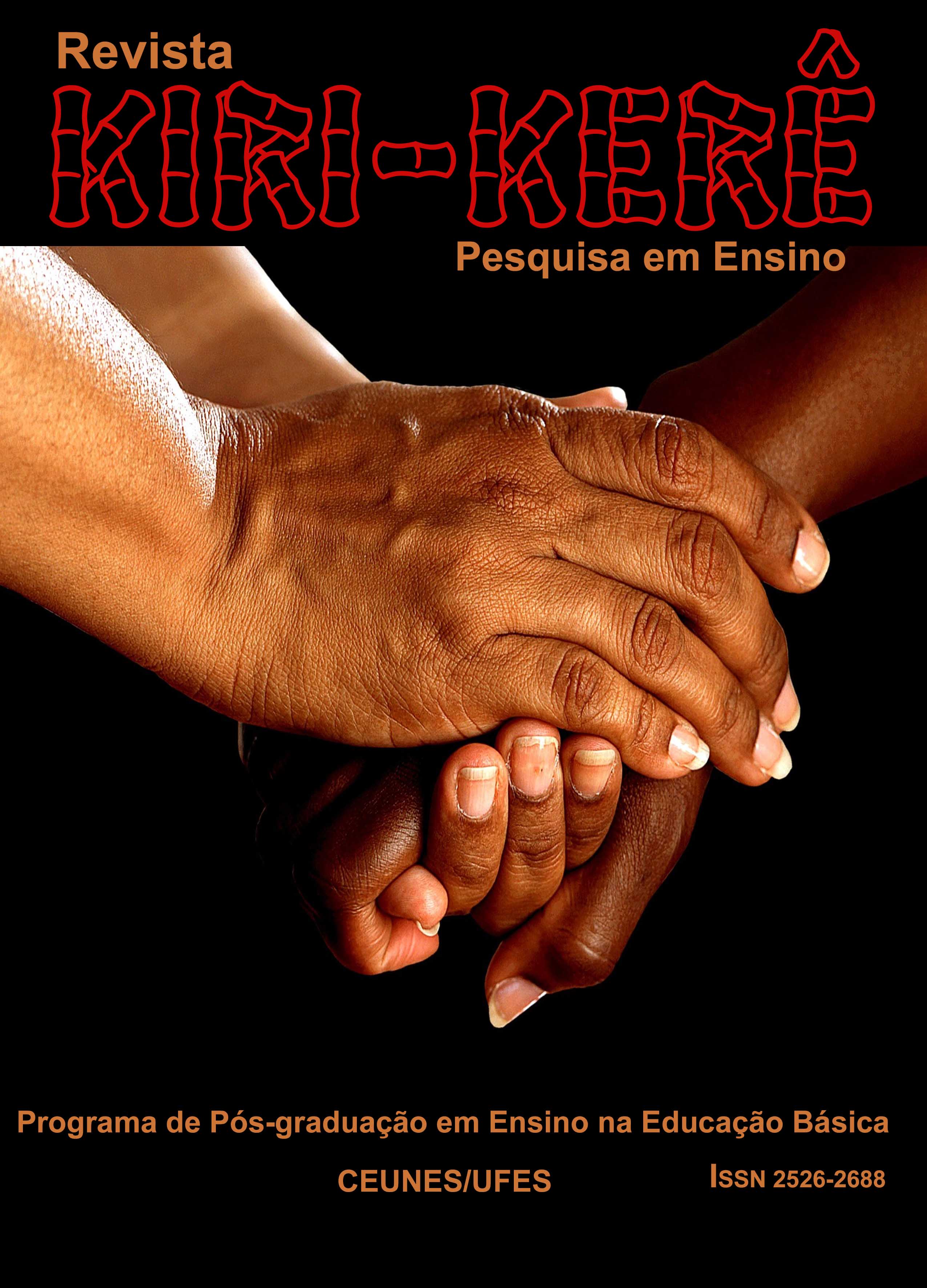Representational meanings of reading and competent reading by brazilian high school students
DOI:
https://doi.org/10.47456/krkr.v1i14.37961Keywords:
Significado representacional; Leitura; Leitor Competente; Língua Portuguesa; Ensino MédioAbstract
This article aims to present the results of the analysis of the representational meanings of reading and competent readers attributed by Brazilian high school students from a federal institution of Basic Education. Methodologically, it is an interpretative qualitative research (CHIZZOTTI, 2006; MOITA LOPES, 1994), in the form of a case study (STAKE, 1994) with a virtual ethnographic basis (SANTOS; GOMES, 2013) whose data were generated with the support of questionnaires (MARCONI; LAKATOS, 1999), written verbal narratives (CLANDININ, 2006; PAIVA, 2008, 2019) and audio-recorded open interviews (COHEN; MANION; MORRISON, 2005; ROSA; ARNOLDI, 2006). Its triangulation (FLICK, 2009) was based on the theoretical framework characterized by the interface between the enunciative perspective of Benveniste (1989, 1995) and categories of analysis of the Transitivity system, from the standpoint of the systemic-functional linguistics of Halliday (1994, 1999) and Halliday and Mathiessen (1999, 2014). The results indicate the emergence of three groups of representational meanings referring to both investigated constructs, outlined, above all, by their ascending nature, presenting tangencies related to the descending and interactional models of text processing, according to the paradigmatic attributes listed in the literature consulted specialist. In light of the articulation between the guidelines for school practices proposed for the axis of reading by the National Common Curricular Base for High School (BRASIL, 2018), the investigation also points out the necessary careful attention that the language teacher must have before the complex reading formation of students, as it is marked by interactions between propulsive and inhibiting processes that influence their development.
Downloads
References
BENVENISTE, E. O aparelho formal da enunciação. In: BENVENISTE, E. Problemas de Linguística Geral II (trad.) E. Guimarães et al. Campinas: Pontes, 1989.
BICUDO, M. A. V. Fenomenologia, confrontos e avanços. São Paulo: Cortez, 2000.
BRASIL. Ministério da Educação. Base Nacional Comum Curricular. Brasília, 2018. Disponível em: http://basenacionalcomum.mec.gov.br/. Acesso em: 20 jan. 2022.
CHIZZOTTI, A. Pesquisa qualitativa em ciências humanas e sociais. Petrópolis, RJ: Vozes, 2006.
CLANDININ, D. J. Narrative Inquiry: A Methodology for Studying Lives Experience. Research Studies in Music Education, 27:44, p. 44-54, 2006. Disponível em: https://journals.sagepub.com/doi/10.1177/1321103X060270010301. Acesso em: 13 jan. 2022.
COHEN, L.; MANION, L.; MORRISON, K. Research Methods in Education. 5th. ed. London/New York: Routledge/Falmer, 2005.
FLICK, U. Introdução à pesquisa qualitativa. (trad.) Joice Elias Costa, 3ª ed. Porto Alegre: Artmed, 2009.
FLORES, V. N. Introdução à teoria enunciativa de Benveniste. São Paulo: Parábola, 2013.
FUZER, C.; CABRAL, S. R. S. Introdução à gramática sistêmico-funcional em língua portuguesa. Campinas: Mercado das Letras, 2014.
GUIMARÃES, E. Os limites do sentido. Um estudo histórico e enunciativo da linguagem. Campinas, SP: Pontes, 1995.
HALLIDAY, M. A. K. An introduction to functional grammar. 2nd. Ed. Londres: Arnold, 1994.
HALLIDAY, M. A. K. Construing experience through meaning: a language-based approach to cognition. London and New York: Continuum, 1999.
HALLIDAY, M. A. K.; MATTHIESSEN, C. M. I. M. Construing Experience Through Meaning. A Language-based Approach to Cognition. New York: Continuum,1999. Disponível em: file:///C:/Users/autra/Downloads/Halliday%20%20Matthiessen%20(1999)%20Construing.pdf. Acesso em: 25 fev. 2022.
HALLIDAY, M. A. K.; MATTHIESSEN, C. M. I. M. Halliday’s Introduction to Functional Grammar, 4th. Edition Revised. New York: Routledge, 2014. Disponível em: file:///C:/Users/autra/Downloads/v.%20Halliday%20%20Matthiessen%20-%20Hallidays%20Introduction%20to%20Functional%20Grammar.pdf. Acesso em: 12 fev. 2022.
KLEIMAN, A. Leitura, ensino e pesquisa, 4 ed. São Paulo: Pontes, 2011.
LEFFA, V. J. Perspectivas no estudo da leitura. Texto, leitor e interação social. In: LEFFA, V. J.; PEREIRA. O ensino da leitura e produção textual. Pelotas, RS: Editora da Universidade Católica de Pelotas, 1999. p. 13 – 37.
MARCONI, M. A.; LAKATOS, E. Mª. Técnicas de pesquisa, 3ª ed. São Paulo: Atlas, 1999.
MEURER, J. L. Schemata and Reading Comprehension. Revista Ilha do Desterro, n. 13, 2008, p. 31 - 46. Disponível em: https://periodicos.ufsc.br/index.php/desterro/article/view/11576 . Acesso em: 26 fev. 2022.
MOITA LOPES, L. P. Pesquisa interpretativista em Linguística Aplicada: a linguagem como condição e solução. Delta, São Paulo, vol. 10, n. 2, p. 329-338,1994. Disponível em: file:///C:/Users/USUARIO/Downloads/MoitaLopesPesqINTERPRETATIVISTA%20(1).pdf. Acesso em: 10 fev. 2022.
NAUJORKS, J. C. Leitura e enunciação: princípios para uma análise do sentido na linguagem. Orientador: Profe. Dr. Valdir do Nascimento Flores. 2011. 153. Tese (Doutorado em Letras) - Faculdade de Letras da Universidade do Rio Grande do Sul, RS, 2011. Disponível em: https://lume.ufrgs.br/handle/10183/37440. Acesso em: 27 fev. 2022.
PAIVA, V. L. M. O. Narrative research: an introduction, 2008. Disponível em: http://www.scielo.br/pdf/rbla/v8n2/en_01.pdf. Acesso em: 21 fev. 2022.
PAIVA, V. L. M. O. Manual de pesquisa em estudos linguísticos. São Paulo: Parábola, 2019.
PARKES, Malcolm. La alta Edad Media. In: CAVALLO, G.; CHARTIER, R. Historia de la lectura en el mundo occidental. Madrid: Taurus, 1997, p. 10 – 12. Disponível em: http://media.utp.edu.co/referencias-bibliograficas/uploads/referencias/libro/334-historia-de-la-lectura-en-el-mundo-occidentalpdf-Lt9q7-resumen.pdf. Acesso em: 14 fev. 2022.
ROSA, M. V. F. P.; ARNOLDI, M. A. G. C. A entrevista na pesquisa qualitativa. Belo Horizonte: Autêntica, 2006, p. 29-68.
SANTOS, F. M.; GOMES, S. H. Etnografia virtual na prática: análise dos procedimentos metodológicos observados em estudos empíricos em cibercultura. VII SIMPÓSIO NACIONAL DA ASSOCIAÇÃO BRASILEIRA DE CIBERCULTURA - ABCiber. Paraná. Anais..., 2013. Disponível em: http://www.abciber.org.br/simposio2013/anais/pdf/Eixo_1_Educacao_e_Processos_de_Aprendizagem_e_Cognicao/26054arq02297746105.pdf. Acesso em: 12 jan. 2022.
STAKE, R. E. Case studies. In: N. K. Denzin e Y. S. Lincoln (eds.). Handbook of qualitative research. London: Sage, 1994. p. 236-247.
VIAN JR., O. Linguística Sistêmico-Funcional, Linguística Aplicada e Linguística Educacional. In: MOITA LOPES, L. P. (org.). Linguística Aplicada na Modernidade Recente. Festchrift para Antonieta Celani. São Paulo: Parábola Editorial, 2013. p. 123-141.
ZAINAL, Z. Critical Review of Reading Models and Theories in First and Second Languages. Jurnal Kemanusiaan. Disponível em: https://www.researchgate.net/publication/42804742_Critical_review_of_reading_models_models_and_theories_in_first_and_second_languages. Acesso em: 25 fev. 2022.
Downloads
Published
Issue
Section
License
Copyright (c) 2022 Rosyanne Autran Lourenço, Edgleuba

This work is licensed under a Creative Commons Attribution-NonCommercial 4.0 International License.
The authors accept, when sending their works, the assignment of their copyrights.

